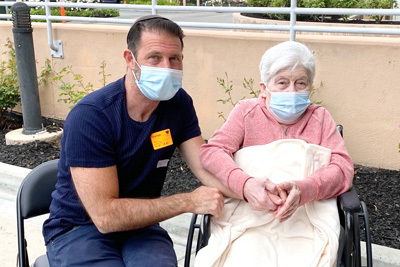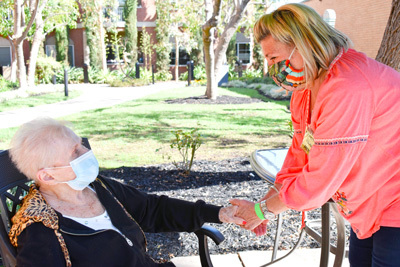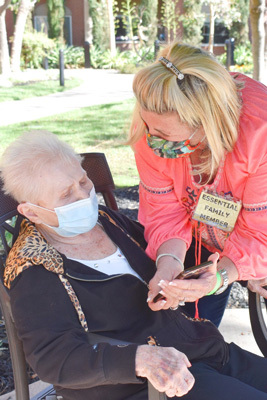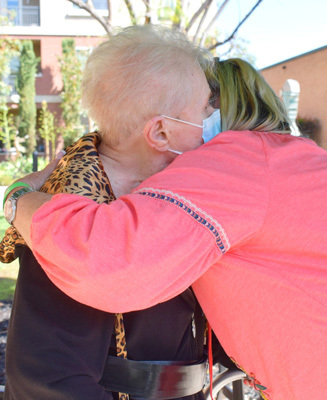Resident Life Joyfully Reopens at the Los Angeles Jewish Home


Resident Life Joyfully Reopens at the Los Angeles Jewish Home

With COVID-19 in retreat in Southern California, residents across Los Angeles including those of the Los Angeles Jewish Home are joyfully reemerging from quarantine and turning the page on a long and challenging year. A sense of normalcy is returning to life at the Jewish Home—and residents are eagerly soaking it in.
"There's tremendous excitement among our residents, who are so ready for a resumption of physical contact with their friends and loved ones," says Larissa Stepanians, chief operating officer of the Jewish Home. "As we come out of the dark tunnel of the pandemic, we're finally able to glimpse a light at the end, and it's definitely created an intensity of emotions."
Those emotions run equally high among residents' family members. "Now that we are both vaccinated, I love that I can finally be with my mom and see she is doing well," says Suzanne Berman. Her mother, Michele Pakula, is a resident of the Home's Goldenberg•Ziman Special Care Center for seniors with Alzheimer's disease and age-related dementia. "The pandemic was very hard, but my mom is a Holocaust survivor. If you can survive that, you can make it through anything."

Janet Bramson, whose mother, Florence Kay, also lives at the Jewish Home, was feeling a similar swell of happiness. "After not being able to see my mom for months, my whole family came to visit, and I feel like we were able to breathe new life into her," Janet says. "We visited and laughed and just had such a warm, wonderful time."
In addition to increased visitation, residents are slowly and safely embracing other pre-pandemic activities, as well, from religious services, to beauty shop appointments, to light gardening. Throughout the reopening, the Jewish Home is closely adhering to California Department of Public Health (CDPH) directives.
"There are numerous state and federal agencies issuing guidelines related to COVID-19, and we are required to follow the most stringent, which is CDPH's guidance," Larissa says.
With its beautiful, landscaped grounds, the Jewish Home has natural advantages that make navigating CDPH mandates easier than it might be at many other facilities. "Our campuses, which consist of between seven and nine gorgeous acres between Eisenberg Village and Grancell Village alone, lend themselves to outdoor activities," Larissa says. "Our residents can soak up the sunshine, sit and read a book, or take a lovely walk often with an aide. Of course, while they're out and about, we ask them to wear personal protective equipment (PPE) to protect themselves and others."

As residents venture beyond their rooms, Jewish Home staff members are working harder than ever, adjusting protocols to suit the new, more relaxed environment. Their primary focus is ensuring residents remain safe and healthy, which means sticking to the Home's comprehensive mitigation plan.
"Every building at the Jewish Home has a plan that includes extensive infection control practices, staff training, and detailed visitation policies," Larissa says. "It's one of the reasons our facilities have done so well throughout the pandemic."
Given the Home's success at reopening thus far, Larissa foresees even more opportunities on the horizon. "We're now looking at bringing back communal dining in a fuller capacity, and eventually we hope to resume some off campus activities, like taking residents shopping," Larissa says. "These things take time to implement, and our residents and their families have been incredibly understanding. But I think we're getting closer—so stay tuned!"
